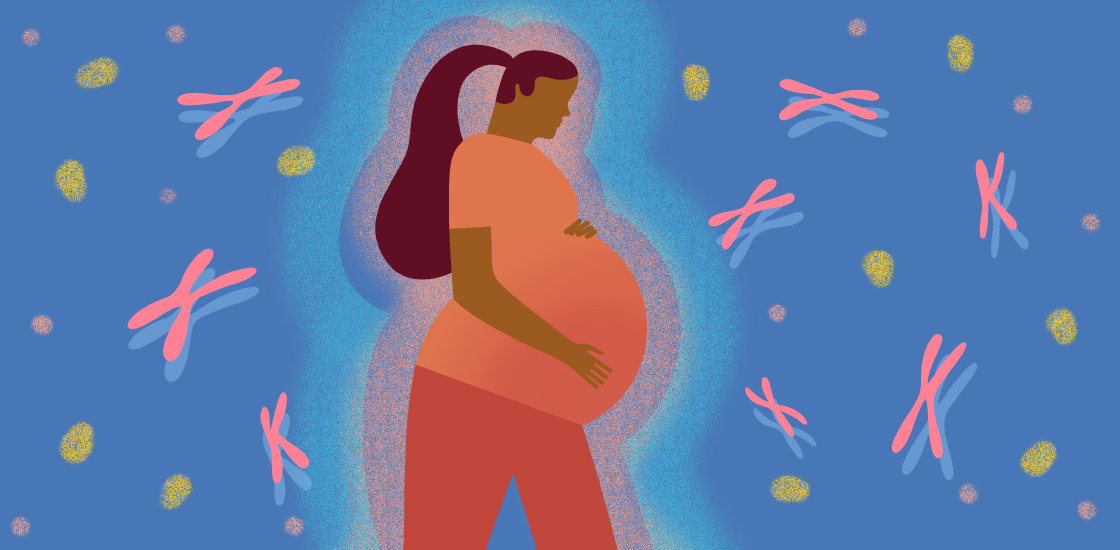Inflammatory bowel disease (IBD) in parents, especially mothers, is associated with autism in children, according to a new study. And children’s autism traits track with an elevated genetic risk for IBD in mothers but not in themselves, suggesting that the traits might be a product of in utero exposure to maternal inflammation or impaired nutrient absorption by the mother, the researchers say.
The team used a four-pronged approach to understand the link. Each method — from simple epidemiological associations to polygenic risk scores — has its own signature of strengths and weaknesses, says study investigator Renee Gardner, researcher at Karolinska Institutet in Stockholm, Sweden. “If you can put different approaches together, you can come up with a much stronger piece of evidence.”
IBD is caused by dysregulation of the immune system and includes ulcerative colitis and Crohn’s disease. People with IBD have gut inflammation that causes symptoms such as diarrhea, tiredness and stomach pain.
Autistic children have a higher risk of IBD than their non-autistic peers, previous studies have shown. They are 47 percent more likely to have Crohn’s disease and 94 percent more likely to have ulcerative colitis, according to a 2018 study. Whether their autism has any connection to their parents’ IBD, though, was less clear.
Maternal inflammation has been linked with autism and other neurodevelopmental outcomes in children, however. So the new results demonstrating a link between autism in children and IBD in their parents, especially mothers, came as little surprise to Judy Van de Water, professor of medicine at the University of California, Davis, who studies autism’s link to maternal immune responses but wasn’t involved in the new work. “It all speaks to maternal immune dysregulation,” Van de Water says.
U
sing medical and administrative datasets from Psychiatry Sweden, a cohort of 2.3 million children born to 1.3 million women and 1.3 million men, Gardner and her colleagues found that IBD in mothers is associated with a 32 percent increased chance of autism in their children compared with controls, and IBD in fathers is associated with a 9 percent increased chance.Common genetic variants linked to IBD (and its two component diseases, ulcerative colitis and Crohn’s) do not correlate with those linked to autism, Gardner’s team found by analyzing data from previous genome-wide association studies. “That result may suggest that the relationship between IBD and autism may not be due to shared common genetic variants,” says study investigator Christina Dardani, a research associate at the University of Bristol in the United Kingdom.
Elevated polygenic risk scores — sums of common variants — for ulcerative colitis and Crohn’s in mothers are linked to increased autism traits in their children, according to data for 7,348 mothers and 7,503 children in the Avon Longitudinal Study of Parents and Children. The same is not true for the children, whose polygenic risk scores for IBD, ulcerative colitis and Crohn’s are not associated with their autism traits, the researchers found, supporting the idea that the link has more to do with the conditions of the prenatal environment.
What’s more, the presence of common variants for ulcerative colitis, and to a lesser extent those for Crohn’s and IBD overall, in mothers are causally associated with autism in their children, Gardner and her team found using a technique called Mendelian randomization. The reverse is not true, however: Common variants for autism are not causally linked to IBD in children.
“We saw associations with polygenic risk score, and then we found causal evidence with the common genetic variants,” Dardani says. “They point to the same story.”
The results were published in Nature Medicine earlier this month.
B
ecause the study focused on genetics, Dardani, Gardner, and their colleagues are not certain about the biological mechanisms underpinning their results. Most of their proposed explanations, though, focus on factors associated with the in utero environment; in addition to immune system effects, previous research has linked prenatal micronutrient malabsorption and anemia with autism in children.“It all does boil down to the idea that there might be these potentially, even relatively subtle, changes in the intra-uterine environment that are just all sort of pushing us kind of one way or another on developmental trajectories,” Gardner says.
The strength of the study, and one that distinguishes it from other similar studies of genetic associations, is that the researchers use several datasets and several approaches to establish the relationship between IBD in parents and autism in their children, says Charis Eng, chair of the Cleveland Clinic’s Genomic Medicine Institute in Ohio, whose work has linked changes in a particular gene, PTEN, to both cancer and autism. Eng was not involved in the study.
The relative homogeneity of people included in the large cohorts the researchers used is a potential weakness of the study, Van de Water says. Most of the genetic data came from individuals of European descent, the authors note in the study. About 90 percent of the children from the Swedish cohort, for instance, have parents who were born in Europe.
“If you’re making recommendations based on these types of studies, you need to have a really representative population,” Van de Water says.
She speaks from experience. Research that Van de Water published last month on maternal autoantibodies as biomarkers for autism showed that one of the autoantibody patterns she and her team found occurred only in mothers born in Mexico. “That surprised the heck out of me,” Van de Water says, “but tells me that every study we do needs to contain as many backgrounds as we can find.”






